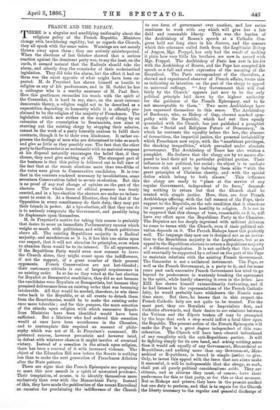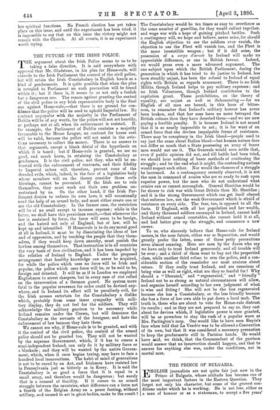FRANCE AND THE PAPACY.
THERE is a singular and unedifying uniformity about the religious policy of the French Republic. Ministers change with bewildering rapidity, but as regards the Church, they all speak with the same voice. Warnings are not merely thrown away upon them • they are actively misinterpreted. When the elections of last October showed that a serious reaction against the dominant party was, to say the least, on the cards, it seemed natural that the Radicals should take the alarm, and silently drop the remainder of their ecclesiastical legislation. They did take the alarm, but the effect it had on them was the exact opposite of what might have been ex- pected. M. de Freycinet has shown himself as hostile to religion as any of his predecessors, and in M. Goblet he has a colleague who is a worthy successor of M. Paul Bert. How this gentleman reconciles his words with the spirit of the Concordat, it is hard to say, since, on the most extreme democratic theory, a religion ought not to be -described as a superstition degrading to humanity while it is -officially pro- claimed to be the religion of the majority of Frenchmen. The legislation which now strikes at the supply of clergy by an extension of the conscription to Seminarists, now aims at starving out the existing clergy by stopping their salaries, cannot be the work of a party honestly anxious to fulfil their contracts, though it be to their own hindrance. It rather ex- -presses the feelings of men who are determined to take as much and give as little as they possibly can. The fact that the other party to the Concordatis an ecclesiastic with no material, weapons at his disposal naturally encourages the belief that, if they choose, they need give nothing at all. 'The strangest part of the business is that • this policy is followed out in full view of the fact that at the recent elections more than two-fifths of the votes were given to Conservative candidates. It is true that in the contests rendered necessary by invalidations, some seventeen Conservatives failed to secure reelection. But this is no proof of any real change of opinion on the part of the electors. The whole force of official pressure was freely exerted, and in a bye-election the electors are under no induce- ment to resist it. At a General Election, they• feel that if the Opposition in every constituency do their duty, they may put their friends in power. At a bye-election, all that they can do is to uselessly exasperate the Government, and possibly-bring its displeasure upon themselves.
M. de Freycinet's motive for taking this eourse is probably that desire to score an immediate Parliamentary success which weighs so much with politicians, and with -French politicians above all. The existing Republican majority is a Radical majority, and mischievous as it is, it has this one claim upon our respect, that it will not abandon its-principles, even when to abandon them would be to its interest. To all-appearance, 'if the Republican Party would even • now consent to leave the Church alone, they might count upon the indifference, if not the support, of a great number of their present -opponents. French Conservatives -are not hot-blooded ; -their customary attitude is one of languid acquiescence in an existing order. In so far as they voted at the last election for Royalist or Bonapartist candidates, they did so not because the candidates were Royalists or Bonapartiets, but because they promised deliverance from an existing • order that was becoming intolerable. All that would beineeded, -therefore, to win these votes back to the Republic,- or at all events to them from the Reactionaries, would be to make the existing order once more tolerable ; and for this purpose, the mere cessation of the attacks upon religion with which successive Repub- lican Ministries have been identified would have been sufficient. But a Minister who had ordered this cessation would at once have been overthrown in the Chamber, - and to contemplate this required an -amount of philo- sophy which was not at M. de Freycinet's command. He preferred success, however precarious and however brief, to defeat with whatever chances it might involve of eventual • victory. Instead of a cessation in the attack upon religion, there has been a renewal of it with increased violence. The object of the Education Bill now before the Senate is nothing less than to make the next generation of Frenchmen Atheists after the State pattern.
There are signs that the French Episcopate are preparing to meet this new assault in a spirit of unwonted prudence. Their temptation, of course, is to identify themselves more exclusively than ever• with the Monarchical Party. Instead of this, they have made the publication of the recent Encyclical an occasion for proclaiming the indifference-of the Church to one form of government • over another, and her entire readiness to work with any which will give her a fair
field and reasonable liberty. This was the burden, of the Archbishop of Rouen's speech at a Catholic Con- gress held not long since in his diocese, and the ensure which this utterance called forth from the Legitimist Bishop of Angers, Mgr. Freppel, has only bad the result of making it plain how very little his brethren are now in accord with Mgr. Freppel. The Archbishop of Paris has oast in his dot with the Archbishop of Rouen, and the Pope has accepted his speech as a full and exact expression of the meaning of .the Encyclical. The Paris correspondent of the Guardian, a shrewd and experienced observer of French affairs, treats this as indicating an intention on the part of the clergy to appeal to universal suffrage. " ' Any Government that will deal fairly by the Church' appears just now to be the only political principle laid down by the highest authority for the guidance of the French Episcopacy, and to be not unacceptable to them." Two more Archbishops have just expressed themselves in this sense. The. Archbishop of Bordeaux, who, as Bishop of Gap,:-showed marked sym- pathy with the Republic, which had not then openly quarrelled with the Church, -has just published a pamphlet on the " Social and Religious Future of Democracy," in which he contrasts the equality before the law, the absence of -favouritism, the impartial justice, the -personal inviolability which Frenchmen now enjoy, with the "exorlaitant privileges, the shocking inequalities," which prevailed under absolute government. The Archbishop of Tours has also written a pamphlet. He declares that the clergy are by no means >dis- posed to lend their aid to particular political _parties. Their influence is not political, but social ; its object is to mediate between rich and poor, by •imbuing them alike "with the great principles of Christian charity, and with the special duties which belong to -both daises." This influence the clergy are ready to " place at the service of any regular Government, independent of its form," demand- ing nothing in- .return but that the Church shall be treated -with simple justice. Here, •then, are four French Archbishops offering, with the full consentiof the Pope, their support to the Republicl on the sole condition-that it abandons its present policy of active hostility to religion. It is not to be supposed that-this change of tone, remarkable as it is, will have any effect upon the Republican Party in the Chamber. The. Deputies are too deeply ingrained with militant Atheism
• to come to terms with the Church, even if their political sal- vation depends on it. The French Bishops know this perfectly well. The language-they now use is designed not as an invita- tion to the Republican• majority in the Legislature, but as an appeal to the Republican electors to return a Republican majority of a different complexion. It is not unlikely that this appeal will eventually be-supported by a refusal on the part of the Pope to maintain relations with the existing -French Government. The Concordat is not a unilateral instrument. The Pope, as well as the French Government, is a party •to it,• and for-some years past each successive French Government has tried trego beyond its predecessors in wantonly breaking the agreement in the spirit, while hardly observing it, even in the letter. Leo XIII. has shown himself extraordinarily forbearing, and if he had listened to the representations of the French Catholic laity, he would probably have withdrawn the Nuncio acme time since. But then,-he knows that in this respect ;the French Catholic laity are not quite • to. be trusted. ForIthe most part, they are Royalists or Imperialists first, and Catholics afterwards, and their desire to see. relations between the Vatican and the tlysee broken off may ,be prompted by the hope that such a step would inflict a fatal blow upon the Republic. The present action of the. French Episcopate will -make the Pope in a great degree independent of this. can- sideration. The Church will have been 'cleared beforehand of any complicity with the anti-Republican parties. It be fighting simply for its own hand, and asking nothinganore than it would ask equally of any Government, Monarchical or Republican, •and nothing more than • any- Government, :Mon- archical or Republican, is bound in simple justice to. give. Only, to invest this appeal with the force that can alone make it successful, it will be indispensable that the clergy, as such, shall put all purely political considerations aside. They aire citizens, and as citizens they must,• of •course, have their preferences for this or that party, or for this or that measure. But as Bishops and priests,• they have in the present conflict but one duty to perform, and that is to regain for the Church the liberty necessary to the regular - and peaceful discharge of her spiritual functions. No French election has yet taken place on this issue, and until the experiment has been tried, it is impossible to say that on this issue the victory might not remain with the Church. At all events, it is an experiment worth trying.



































 Previous page
Previous page